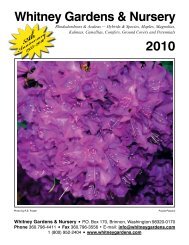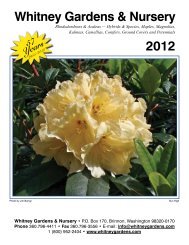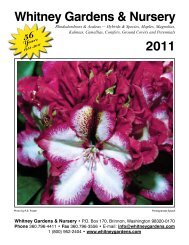Download the Catalog! - Whitney Gardens & Nursery
Download the Catalog! - Whitney Gardens & Nursery
Download the Catalog! - Whitney Gardens & Nursery
Create successful ePaper yourself
Turn your PDF publications into a flip-book with our unique Google optimized e-Paper software.
preserves, pies and o<strong>the</strong>r culinary choices. Plants spread by runners. Best<br />
grown in full sun, in moist, well-drained, fertile soil. Strawberries are<br />
ei<strong>the</strong>r everbearing, meaning an early crop and a fall crop or spring crop<br />
which is an early but heavy producing crop. Hardy to 0°F. $2.00<br />
Benton - Bright red, late ripening spring crop with excellent quality.<br />
Drought and disease resistant.<br />
Chandler - Glossy and very firm skin and flesh on this spring crop.<br />
Excellent flavor and does well in <strong>the</strong> Pacific Northwest.<br />
Hood - One of <strong>the</strong> best for flavor. Known for its use in jams and preserves.<br />
This spring crop berry is bright red with excellent flavor.<br />
Quinault - Medium sized, firm, red berries on this everbearing plant.<br />
Outstanding flavor. Recommended for <strong>the</strong> Pacific Northwest.<br />
Rainier - Extra hardy, spring crop produces outstanding fruit quality.<br />
Seascape - Everbearing, early ripening, with large, evenly shaped berries<br />
that are red through and through. Ideal fresh or frozen.<br />
Tillamook - High yields of very large fruit on this spring crop of berries<br />
with excellent flavor.<br />
Tri Star - Large everbearing, red berries with an excellent flavor. Great<br />
for growing in hanging baskets.<br />
Apple<br />
Growing apple trees in <strong>the</strong> home garden can be fun and rewarding. There<br />
are many varieties of apples but <strong>the</strong> list below are those that do very well<br />
in <strong>the</strong> Pacific Northwest. All apple trees must be pollinized by a different<br />
variety. Plant in well-drained, fertile soil and in full sun. Do not put fertilizer<br />
in <strong>the</strong> hole at planting time, this can burn <strong>the</strong> roots. Prune and thin<br />
lightly on young trees. All apple varieties that we carry are semi-dwarf<br />
and grow to 10’ tall. Hardy to -10°F. or more. $30.00<br />
Gala - Red skin tinted with yellow streaks, covers a spicy-sweet flavor.<br />
Ripens in early September. Medium sized, crisp, aromatic flavored<br />
apple. Bears at a young age. Good pollinator.<br />
Gravenstein - Very flavorful, crisp and juicy apples that do not store as<br />
well as some varieties. Requires two pollinators and does not pollinate<br />
o<strong>the</strong>r apples.<br />
Honeycrisp - Large 3” Flourescent-red apple with a sweet-tart flavor<br />
and a delicious texture. This apple is said to have <strong>the</strong> best crunch and is<br />
one of <strong>the</strong> best keepers. Ripens in early September. Good pollinator.<br />
Liberty - Medum tart, red skinned, high quality eating and cooking<br />
apple. Flesh is crisp and juicy. Bears fruit at a young age and is a very<br />
heavy producer. Ripens in early September. Highly disease resistant. A<br />
great pollinator.<br />
Zestar - A crisp and juicy apple best known for its excellent sweet tart<br />
flavor with a hint of brown sugar. Ripens in late August to late<br />
September. Apples remain crisp for 2-3 months in <strong>the</strong> refrigerator. Good<br />
pollinator.<br />
Cherry<br />
We carry two types of cherry trees, Sweet cherries and Tart cherries.<br />
Sweet cherries need to be pollinized by ano<strong>the</strong>r variety. We carry semidwarf<br />
trees that grow to 10’- 12’ tall and are hardy to -10°F. They are<br />
exellent for eating fresh and canning. Tart cherries, also called sour or pie<br />
cherries are easy to grow. Use <strong>the</strong> tangy fruit for baking or let it overripen<br />
on <strong>the</strong> tree for fresh eating. Tart cherries are self-fertile and grow to 10’<br />
tall. They bear fruit at an earlier age than sweet cherries. Hardy to -20°F.<br />
All cherries should be planted in full sun, with good air circulation and<br />
in rich, fertile, well-drained soil. $35.00<br />
Bing - (Sweet) Burgundy red skin and flesh. Flesh is large, firm, very<br />
juicy and sweet. Excellent for eating and canning. Requires a pollinator<br />
such as Rainier. Fruit ripens in late June to mid-July.<br />
Meteor - (Tart) Large, bright red fruit with yellow flesh. Great for pies,<br />
jellies, and preserves. Does well in all climates. Self-fertile. Ripens in<br />
mid to late July.<br />
North Star - (Tart) Red skin with red flesh. Grows to 10’ tall. Bears<br />
heavily. A meaty tart pie cherry. Self-fertile. Ripens in early July.<br />
Rainier - (Sweet) Golden yellow skin with a red blush. Large, firm,<br />
juicy and sweet cherry, excellent for eating and canning. A vigorous<br />
grower. Fruit is resistant to cracking. Requires a pollinator such as Bing.<br />
Ripens in mid-July<br />
Stella - (Sweet) Black skin and flesh, which is very sweet and juicy.<br />
Large sized fruit and a vigorous grower. Self-fertile, but also makes a<br />
great pollinator. Ripens late June to early July.<br />
Fig<br />
Wonderful ornametals as well as fruiting plants. Large tropical looking<br />
foliage and spreading habit. The fig varieties we carry are good for <strong>the</strong><br />
Pacific Northwest. Figs are self fertile and should be grown in full sun<br />
or part shade. The fruit can be eaten fresh or used in cooking and baking.<br />
Plant in fertile, well-drained soil. Hardy to 0°F. $20.00<br />
Brown Turkey - Very large, sweet, delicious brown figs with light<br />
amber flesh on a small growing tree.<br />
Conadria - Light greenish-yellow skin with pink flesh. Great used fresh<br />
or dried.Very vigorous, long-lived tree.<br />
Desert King - One of <strong>the</strong> most reliable varieties. Bears abundant crops<br />
of yellowish-green fruit with delectably sweet, strawberry colored flesh.<br />
Oregon Prolific - Medium sized tree, produces yellowish-green fruit<br />
with white flesh. Good fresh or canned.<br />
Texas Everbearing - Medium to large fruit with a reddish-brown skin<br />
and reddish-pink flesh. The fruit is plump and has a mild, sweet flavor<br />
on a small growing tree.<br />
Filbert<br />
The only true dwarf nut tree, <strong>the</strong>se small trees produce prized yellow<br />
catkins that cover <strong>the</strong> tree in mid-winter. They produce tasty and nutritious<br />
nuts. Best grown in full sun. Filberts require pollinators, so choose<br />
two varities. Plant in well-drained, fertile soil. Hardy to -15°F. $20.00<br />
Jefferson - A wonderful hazelnut selection from Oregon State University.<br />
Features large, tasty nuts and has a high productivity. Immune to Eastern<br />
Filbert Blight. Best pollinated by Theta.<br />
Theta - Small to mediums sized tasty nuts. Also from <strong>the</strong> Oregon State<br />
U. breeding program. Use Jefferson as a pollinator.<br />
Pear<br />
Like apples, pears must have a pollinizer of a different variety. They also<br />
need to be planted in full sun and in an area with good air circulation.<br />
Plant in well-drained, fertile soil. We carry semi-dwarf trees that can<br />
grow to 10’ tall. Pears ripen from <strong>the</strong> inside out, so don’t leave fruit on<br />
<strong>the</strong> tree to long or <strong>the</strong>y will become mushy. Hardy to -10°F. $35.00<br />
Anjou - Medium to large fruit with smooth, thin, yellow-green skin.<br />
White, very sweet flesh on a vigorous growing tree. Used for eating<br />
fresh. Ripens best off <strong>the</strong> tree. Harvest in September. Suggest Bartlett as<br />
a pollinizer.<br />
Bartlett - Large, bell-shaped fruit with greenish-yellow skin and flesh<br />
that is sweet, juicy, firm, and has a fine texture. Excellent for eating and<br />
canning. A terrific dessert pear. Bears heavily and consistantly in late<br />
August to early September. Suggest Anjou as a pollinator.<br />
Twentieth Century - (Oriental Pear) - Medium to large round, yellow<br />
skin with white flesh that is sweet, mild, and juicy. Has a more apple-like<br />
texture. Best when tree ripened. Great for eating and for canning. Stores<br />
well for a period of time. Ripens in mid-September. Partially self-fertile<br />
but, suggest Bartlett for a pollinizer.<br />
Plum<br />
Plum trees are very easy to grow, and require very little training or pruning.<br />
Plant in moist, but well-drained, fertile soil with organic materials<br />
such as manure. Grow in full sun. These varieties are semi-dwarf growing<br />
to 10’ tall. Plums are a very nutritous fruit. Although some plum<br />
varieties are self-fertile we recommend planting 2 different varieties to<br />
optimize fruit production. Hardy to -10°F. $35.00<br />
Green Gage - Medium sized greenish-yellow skin with flesh that is<br />
tender, sweet, juicy and rich in flavor. Use fresh, cooked, dried, or<br />
canned. Ripens in mid-August to early September. Self-fertile.<br />
Santa Rosa - A red skinned plum with gold flesh and a sweet-tart flavor.<br />
The fruit is large and keeps well. Excellent for eating. Ripens in late July.<br />
Requires a pollinator such as Stanley.<br />
Prune<br />
Prunes are rich in dietary fiber that is effective in improving digestion.<br />
They are low in calories and contain ample amounts of vitamin C, calcium<br />
and potassium. They are high in sugar content which makes <strong>the</strong>m<br />
wonderful for drying. Plant in well-drained, fertile soil and full sun.<br />
Growth habit is 10’-12’ on <strong>the</strong>se semi-dwarf varieties. Hardy to -10°F.<br />
$35.00<br />
French Petite - Small to medium, long and oval fruit with purplishblack<br />
skins and green-yellow flesh. Very sweet and juicy. Use fresh,<br />
dried, or for jams and preserves. Ripens in August to September. Selffertile.<br />
Italian - Medium sized purple skin with firm, sweet flesh. Good for<br />
fresh eating and drying. Bears heavily and consistantly. Ripens in early<br />
September. Self-fertile.<br />
Stanley - Oval shaped, dark blue skin with yellow, juicy, tender and<br />
sweet flesh. Great for cooking and eating fresh. Bears heavily and is selffertile,<br />
but works as a great pollinator. Ripens in early September.<br />
Website: www.whitneygardens.com. • Brinnon, WA 98320 • Ph: (800) 952-2404 • Fx: (360) 796-3556<br />
Email: info@whitneygardens.com 83





